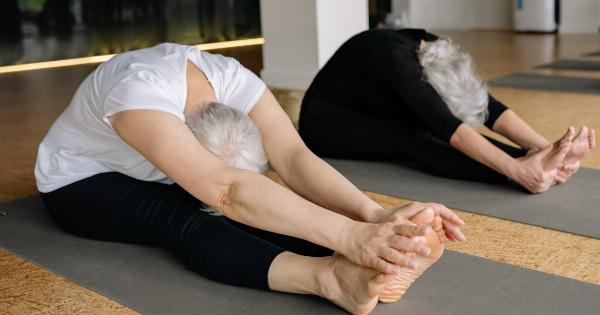Frequent sex is a normal part of a healthy adult’s life and can have numerous physical and emotional benefits. However, there are misconceptions surrounding the issue of vaginal stretching, often fueled by myths and misinformation.
In this article, we will delve into the topic of vaginal stretching, discussing what it is, what factors can contribute to it, and if frequent sex can cause it.
What is vaginal stretching?
Vaginal stretching refers to the increased size or laxity of the vaginal canal. It can occur as a result of various factors, such as childbirth, hormonal changes, age, or certain medical conditions.
The vaginal canal is designed to have some degree of elasticity to accommodate childbirth and sexual activity.
Factors that contribute to vaginal stretching
While frequent sex is often attributed to causing vaginal stretching, the reality is that there are several other more significant factors that contribute to it:.
1. Childbirth
The primary cause of vaginal stretching is childbirth. During vaginal delivery, the baby passes through the birth canal, causing the vaginal muscles and tissues to stretch.
The extent of stretching can vary depending on factors like the size of the baby and the number of vaginal deliveries a woman has had.
2. Hormonal changes
Hormonal changes that occur during menopause can lead to vaginal dryness and thinning of the vaginal walls. This can result in a feeling of looseness or stretching sensation during sexual activity.
3. Age
As women age, the collagen and elastin fibers in their body naturally degrade, including those within the vaginal tissues. This can lead to a decrease in vaginal tightness and contribute to the perception of vaginal stretching.
4. Genetics
Genetics can play a role in determining the natural elasticity of vaginal tissues. Some women may inherently have a tighter or looser vagina, regardless of their sexual activity levels.
5. Trauma or injury
Any trauma or injury to the pelvic area can result in stretching of the vaginal tissues. This includes accidents, pelvic surgeries, or sexual trauma.
Debunking the myth: Can frequent sex cause vaginal stretching?
Contrary to popular belief, frequent sex alone does not cause vaginal stretching. The vagina is a remarkable organ that expands and contracts during sexual activity and returns to its resting state afterwards.
The muscles of the vagina are designed to be flexible and resilient, allowing them to accommodate various sizes without long-term stretching.
However, it is important to note that rough or forceful sex can potentially cause temporary discomfort or even some minor tears or micro-traumas in the vaginal tissues.
These may lead to a sensation of stretching, but they typically heal on their own within a few days without causing permanent stretching or damage.
It is also crucial to differentiate between vaginal stretching and pelvic floor disorders, such as pelvic organ prolapse or urinary incontinence.
These conditions are not directly related to frequent sex but can be influenced by factors like childbirth, age, and genetics.
Signs and symptoms of vaginal stretching
The following signs and symptoms may indicate vaginal stretching:.
1. Feeling of looseness or lack of tightness
Some women may feel a difference in vaginal tightness compared to their own previous experience or their perception of what is ideal. However, this is subjective, and what feels loose to one woman may still be perfectly normal for another.
2. Decreased sexual satisfaction
Vaginal stretching can sometimes lead to decreased sexual satisfaction due to reduced friction during intercourse. This can affect both partners and may require exploring alternative sexual techniques or using additional lubrication.
3. Difficulty using tampons or other vaginal devices
If the vaginal opening becomes too wide, some women may experience difficulty inserting tampons or other vaginal devices. This can be a sign of vaginal stretching but could also be indicative of other underlying issues, such as pelvic floor weakness.
Treatment options for vaginal stretching
If vaginal stretching is affecting a woman’s quality of life or causing significant distress, several treatment options can help:.
1. Pelvic floor exercises
Exercises that target the pelvic floor muscles, such as Kegel exercises, can help improve muscle tone and support the vaginal tissues. This can potentially provide a feeling of increased tightness and improve sexual satisfaction.
2. Hormone therapy
For menopausal women experiencing vaginal dryness and thinning, hormone therapy may be beneficial. Estrogen-based treatments can help restore the elasticity and lubrication of vaginal tissues, reducing the sensation of vaginal stretching.
3. Vaginoplasty
In severe cases where non-surgical interventions have not provided satisfactory results, vaginoplasty, a reconstructive surgical procedure, can be considered.
This procedure tightens and rejuvenates the vaginal tissues, addressing concerns related to vaginal stretching.
Conclusion
Vaginal stretching is a complex issue influenced by various factors, including childbirth, hormonal changes, age, and genetics.
While frequent sex alone does not cause permanent vaginal stretching, it is essential to differentiate between temporary discomfort or minor tears that can occur during rough or forceful sexual activity and long-term stretching. If vaginal stretching causes significant distress, various treatment options, from pelvic floor exercises to vaginoplasty, can be explored.
It is crucial for individuals to consult with healthcare professionals for accurate diagnosis and appropriate management.





























